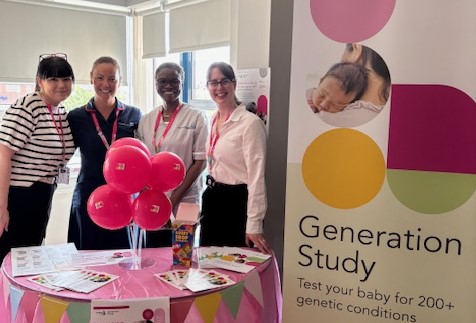Published on: 17 September 2025
Parents getting ready to welcome their baby into the world are being offered a test for more than 200 rare genetic conditions.
Among those being invited to take part are families being offered Maternity care at Sunderland Royal Hospital and South Tyneside District Hospital.
They are among more than 40 NHS hospitals so far which have agreed to take part in the Generation Study. It is being led by Genomics England in partnership with NHS England.
The world-leading research aims to screen 100,000 newborns in England, offering them whole genome sequencing. This will use blood samples usually taken from their umbilical cord shortly after birth.
The study will identify rare conditions such as Metachromatic leukodystrophy (MLD) in babies sooner. This is a rare inherited disorder which affects the brain. It causes a progressive loss of physical and, later, mental skills.
The checks could help hundreds to benefit from earlier diagnosis and treatment. This could slow the progression of rare conditions and even extend their lives.
The research will help support the NHS 10 Year Health Plan’s shift from sickness to prevention. The other two moves are from analogue to digital and hospital to community.
Research Midwife Lucy Rowland is part of the team at South Tyneside and Sunderland NHS Foundation Trust.
She said:
"We’re really excited to be part of this study as a Trust.
“Research is an important way we can help families in the future get the support and treatment they need.
"Families are approached in hospital during their pregnancy. Patients are offered an information leaflet and given the opportunity to ask questions. They can also access further information through the Generation Study website or scanning a QR code.
"If a condition is suspected, the appropriate treatment can be started promptly as early intervention is key. It will be interesting to see this study develop."
Rachel Nicholson is one of the consultants on the Maternity team.
She said:
"We will be with parents every step of the way with this study.
"While we want as many people as possible to sign up to help build the biggest picture we can of genetic conditions, we want to stress there is no pressure to get involved. Everyone knows what is right for them and their family.
"Research is a key part of our work as a Trust and this study can make a difference there and then, but also for so many more people in the future."

Angela Lightfoot, Generation Study Regional Results Co-ordinator, Lucy Rowland, Research Midwife, Folasade Olufemi -Ajayi, Research Assistant Practitoner and Amy Clarkson, Generation Study Results Coordinator.
The Generation Study has been set up following consultation with the public, parents and families affected by rare conditions. Healthcare professionals, policy makers and scientists have also been involved.
Expectant parents will be told about the study during pregnancy. If they are interested, a research midwife will then talk to them in detail. This will help them decide if they wish to take part.
Shortly after birth, a doctor, nurse or midwife will confirm with parents they are still happy for their baby to be tested. A blood sample will be taken and sent to a laboratory sequencing. If a baby is identified as having a treatable childhood condition, families and carers will be provided with further NHS testing to confirm a diagnosis. They will also get ongoing support and treatment from the NHS.
The study will also consult a range of groups to look at the possible risks and benefits of keeping a baby’s genome over their lifetime. This could help predict, diagnose and treat future illnesses.
More details about the study can be found through this page: Generation Study







